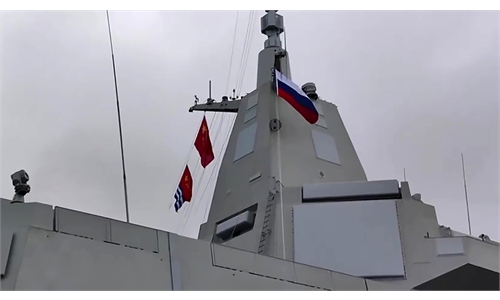Effective response to international security threats requires accepting different political systems, not attempting to impose uniformity

Illustration: Liu Xidan/GT
President Xi Jinping has repeatedly emphasised since 2017 that the world is undergoing profound changes unseen in a century. In July 2022, then state councillor and foreign minister Wang Yi noted that this perspective had been fully confirmed due to recent events. And the trend is deepening.
The world today is simultaneously experiencing international economic slowdown, the aftermath of a global pandemic, a major war in Ukraine involving nuclear armed powers in NATO and Russia, and a path of climate change which, while some countries have achieved progress, actions by others currently means that the planet will not stay within boundaries of global warming.
As a result, in addition to military conflict, which is the "traditional" threat to global security, many "non-traditional" threats have also developed - the consequences of economic slowdown, pandemics, climate change, terrorism, risks to adequate water supply in some areas of the world, the threat of large-scale population movements attempting to escape consequences of these developments.
The key conclusion flowing from this situation is that the framework of "a human community with a shared future," put forward by Xi, which forms the strategic basis of China's foreign policy, is fundamental for dealing with security challenges of both "traditional" and "non-traditional" types. It is therefore crucial that this framework is as widely understood internationally as possible. Opportunities to achieve this are increasing because a rising number of people and countries do not wish to participate in processes which worsen the global and their own situation - as recent events confirm. They wish to pursue a collaborative course, of which Xi's concept is the most coherent expression and which, as will be seen, can be applied to countries with different political systems.
Because Xi's concept is so important and because I am an economist, I will concentrate on the economic basis of this.
The history of humanity's development is that of its increasing interaction. Humanity started in families and small tribal groups, then formed states, empires and eventually the entire world.
The force driving this was pointed out by both Adam Smith, founder of Western economics, and Karl Marx, founder of socialist economics. Division of labour, Smith's terminology, socialisation of labour, Marx's terminology for the same development, means that via social production humans produce far more, and achieve a vastly higher standard of life, than any individual. Furthermore, different countries have different advantages in production, therefore by cooperating they can be far more productive than a single country.
But this has another implication. The advantage comes from countries being different, not identical. These differences inevitably give rise to different social and political systems.
But regardless of different social and political systems countries face numerous common global problems, including "non-traditional" ones that can best or only be solved by collective action.
This fact determines the forms of successful international cooperation. As countries are necessarily different, they must co-exist on the basis of multilateralism, of accepting the inevitability of these differences, without one country attempting to impose its demands and system on the others - any attempt to do that will necessarily create damage.
To illustrate international organizations which implement these principles successfully, take developing Asian countries, and successful organizations they have created to deal with common problems.
ASEAN contains countries with diverse political systems - socialist in China, monarchy in Thailand, numerous republics.
Or take the Shanghai Cooperation Organisation, which contains a socialist country China, an Islamic republic Iran, and numerous non-religious republics.
What has made these organizations successful is that they do not attempt to impose political uniformity nor are they military alliances to deal with traditional security threats. The majority of issues they face are "non-traditional." These include:
Terrorism - one of the key threats to SCO countries was from jihadist terrorism that spread widely in Middle East after the US destabilized the region through the invasion of Iraq. Cooperation in the SCO considerably aided the struggle against the spread of such terrorism.
Economic development - ASEAN is the world's most rapidly economically growing regional group of countries. This in turn helped maintain stability in all countries in the region.
Climate change - many Asian developing countries are particularly at risk from this, as recent heat waves in China and devastating floods in Pakistan confirm. Countries in the region are cooperating to face this common threat.
This very successful cooperation against numerous "non-traditional" security threats takes place with no attempt to impose a uniform political system or a single military alliance.
Contrast the instability the US approach has created not only in the Middle East but now in Europe. Throughout most of Europe, the US has created a single military alliance - NATO. It has supported a single political system, a secular parliamentary or presidential one. What has accompanied this is the biggest chaos in Europe since World War II - the highest inflation for 40 years, declining living standards and a major war.
The conclusion for successful international cooperation is clear. There should not be attempts to create a single model, countries should cooperate to meet common threats, whether "traditional" or "non-traditional," accepting different national political systems and not attempting to interfere in these.
The author is Senior Fellow at Chongyang Institute for Financial Studies, Renmin University of China. The article is his speech at the Lanting Forum conference on "The Global Security Initiative: China's Proposal for Solving Security Challenges" on February 21, 2023. opinion@globaltimes.com.cn


